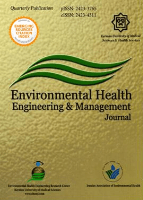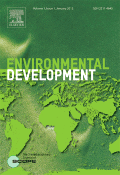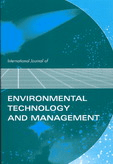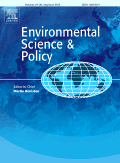
Environmental Science and Ecotechnology
Scope & Guideline
Pioneering research for environmental stewardship.
Introduction
Aims and Scopes
- Sustainable Development and Resource Management:
Research emphasizing the sustainable management of natural resources, including water, soil, and biodiversity, particularly in the context of climate change and urbanization. - Environmental Remediation Technologies:
Development and evaluation of technologies for the remediation of contaminated environments, including wastewater treatment, soil decontamination, and air quality improvement. - Impact of Pollution on Ecosystems and Health:
Investigations into the effects of pollutants, such as microplastics, heavy metals, and persistent organic pollutants, on ecosystems and human health. - Innovative Analytical Techniques:
Application of advanced analytical methods, including machine learning and genomics, to assess environmental quality and ecosystem health. - Policy and Governance for Environmental Sustainability:
Exploration of policy frameworks and governance strategies aimed at achieving environmental sustainability and addressing climate change.
Trending and Emerging
- Artificial Intelligence and Machine Learning Applications:
There is a growing trend towards integrating AI and machine learning in environmental research, enhancing predictive modeling, data analysis, and decision-making processes in various environmental contexts. - Circular Economy and Waste Valorization:
Research focused on transforming waste into valuable resources is on the rise, highlighting innovative approaches to waste management and resource recovery. - Climate Change Mitigation and Adaptation Strategies:
An increasing number of studies are addressing both mitigation measures and adaptation strategies to cope with the impacts of climate change, particularly in urban environments. - Biodiversity Conservation and Ecosystem Services:
Emerging research themes are centered on understanding and preserving biodiversity, along with the ecosystem services it provides, in the face of anthropogenic pressures. - Advanced Bioremediation Techniques:
Innovative bioremediation strategies utilizing microbial and plant systems to mitigate environmental contaminants are gaining traction, reflecting a shift towards more sustainable remediation practices.
Declining or Waning
- Traditional Pollution Control Methods:
Research focusing solely on conventional methods of pollution control is becoming less prevalent as the field shifts towards more innovative and integrated approaches. - Single-Factor Environmental Studies:
Studies that examine environmental issues in isolation, without considering the complex interactions between multiple factors, are being overshadowed by more holistic and systems-based approaches. - Basic Ecological Studies:
While foundational ecological research remains important, there is a noticeable decline in studies that do not incorporate technological innovations or applications in environmental science.
Similar Journals

Environmental Health Engineering and Management Journal
Transforming Environmental Insights into Health SolutionsEnvironmental Health Engineering and Management Journal is a premier platform dedicated to the dissemination of research findings in the essential field of environmental health. Published by Kerman University of Medical Sciences in Iran, this Open Access journal has been a beacon of scientific inquiry since its inception in 2014. With an ISSN of 2423-3765 and E-ISSN 2423-4311, it facilitates broad accessibility to cutting-edge research that addresses the complex interactions between environmental factors and human health. With a notable categorization in the Q3 quartile for Environmental Science and Public Health, alongside Q4 in Chemical Health and Safety, the journal underscores its commitment to quality and relevance. Currently ranked #132 out of 233 in Environmental Science within Scopus, it serves as a crucial resource for researchers and practitioners striving to tackle contemporary environmental challenges. The journal's scope includes innovative methodologies, environmental risk assessment, and sustainable health practices, positioning it as an indispensable reference for those invested in improving public health outcomes through environmental engineering and management.

ENVIRONMENT AND DEVELOPMENT ECONOMICS
Fostering Dialogue on Development and Environmental SustainabilityEnvironment and Development Economics, published by Cambridge University Press, stands as a pivotal journal in the fields of development economics and environmental science. With a robust ISSN of 1355-770X and an E-ISSN of 1469-4395, this esteemed publication has been a significant contributor to scholarly discourse since its inception in 1996 and continues to thrive with a convergence of research insights expected to run until 2024. Distinguished by its Q1 status in Development and its Q2 rankings in both Economics and Econometrics and Environmental Science (Miscellaneous) for 2023, the journal reflects its commitment to high-impact research. Notably, it ranks 58th out of 306 in Social Sciences Development and maintains respectable standings in other categories, emphasizing its importance in shaping policies and practices at the intersection of economics and environmental sustainability. Researchers, professionals, and students engaged in these disciplines can access this journal for thought-provoking articles that advance understanding of economic development while addressing environmental challenges.

EQA-International Journal of Environmental Quality
Unlocking insights for a healthier planet.EQA-International Journal of Environmental Quality, published by the University of Bologna, Department of Agricultural Sciences, is a premier open-access journal dedicated to the multidisciplinary exploration of environmental quality issues. Established in 2009, it aims to foster a greater understanding of the intricate interactions between human activities and environmental health. With a focus on innovative research, the journal contributes to the advancement of knowledge across diverse fields, making it an essential resource for researchers, professionals, and students engaged in environmental science and sustainability. The journal operates with an emphasis on accessibility, ensuring that critical findings reach a global audience without barriers. With an impressive Scopus rank of 88 out of 171, EQA stands as a significant platform for disseminating impactful research that informs policy and promotes environmental stewardship.

Euro-Mediterranean Journal for Environmental Integration
Advancing Environmental Solutions for a Sustainable Euro-Mediterranean FutureThe Euro-Mediterranean Journal for Environmental Integration, published by SPRINGER HEIDELBERG, serves as a pivotal platform for interdisciplinary research in the realm of environmental science, particularly focused on the unique ecological and socio-economic context of the Euro-Mediterranean region. With its ISSN 2365-6433 and E-ISSN 2365-7448, this journal aims to foster a collaborative approach to environmental challenges, integrating insights from various fields such as ecology, geography, and sustainable development. Since its inception in 2016, it has made significant strides, achieving a Q3 ranking in Environmental Science and maintaining a notable position within the Scopus rankings, sitting at #102 out of 233 in the general environmental science category, which reflects its growing influence in academic discourse. The journal is committed to open dialogue among researchers, professionals, and students aimed at advancing knowledge and promoting innovative solutions to pressing environmental issues. Access to its comprehensive articles and findings will be key to contributing to a more sustainable future.

Environmental Development
Shaping the future of environmental policy through rigorous research.Environmental Development is a premier academic journal published by Elsevier, dedicated to advancing the field of environmental science through interdisciplinary research and innovative practices. With a focus on geography, planning, and development, as well as management, monitoring, policy, and law, this journal provides a rigorous platform for scholars and practitioners to share insights that shape sustainable environmental policy and practice. Holding a prestigious Q1 ranking in both relevant categories and boasting impressive Scopus rankings - 62 out of 821 in Geography and 60 out of 399 in Environmental Science - Environmental Development stands out as a critical resource for those invested in the future of our planet. The journal emphasizes impactful research that addresses contemporary challenges, fostering dialogue across disciplines and geographical boundaries. With a commitment to high-quality research, it offers an important outlet for those aiming to influence environmental policy and developmental strategies globally. Join the growing community of researchers, professionals, and students engaged in promoting sustainable environmental practices through the knowledge shared in this esteemed publication.

International Journal of Environmental Research
Championing rigorous research for a healthier planet.Welcome to the International Journal of Environmental Research, a premier publication in the field of environmental science, published by Springer International Publishing AG. With an ISSN of 1735-6865 and an E-ISSN of 2008-2304, this journal has established itself as a vital resource for researchers, professionals, and students committed to advancing the understanding of environmental issues. Since its inception in 2007, the journal has maintained an impressive Q2 ranking in Environmental Science (Miscellaneous) and holds a notable 70th percentile position in the Scopus rankings, reflecting its high-quality contributions and reputation in the academic community. While the journal is not Open Access, it provides a platform for rigorous, peer-reviewed research covering diverse topics in environmental science, thus fostering a collaborative and informed approach to addressing global environmental challenges. Located in Switzerland at Gewerbestrasse 11, Cham CH-6330, the journal is committed to publishing innovative research that informs policy and practice, making it an essential reference point for anyone engaged in the study and management of the environment.

Water Conservation Science and Engineering
Transforming Water Challenges into Engineering SolutionsWater Conservation Science and Engineering, published by SPRINGERNATURE, is a vital academic journal dedicated to advancing the fields of environmental engineering, ocean engineering, waste management, and water science and technology. Since its inception in 2016, the journal has quickly established itself within the academic community, achieving a commendable Q3 ranking across multiple categories in 2023. With an ISSN of 2366-3340 and an E-ISSN of 2364-5687, it is accessible to a global readership eager to explore the latest research and innovations in water conservation and sustainable practices. Although currently not open access, the journal is committed to publishing high-quality scholarly articles that provide insights into effective water management strategies, innovative engineering solutions, and the critical importance of preserving our water resources. Based in Singapore, Water Conservation Science and Engineering aims to foster interdisciplinary collaboration among researchers, professionals, and students, making it an essential resource for anyone passionate about environmental sustainability and preservation.

International Journal of Environmental Technology and Management
Transforming challenges into opportunities for effective environmental management.Welcome to the International Journal of Environmental Technology and Management, a leading publication dedicated to the critical intersection of environmental technology and management, published by InderScience Enterprises Ltd in the United Kingdom. With an ISSN of 1466-2132 and an E-ISSN of 1741-511X, this journal has established itself as an essential resource for researchers, practitioners, and policymakers alike. Although it is currently not an Open Access journal, it provides vital insights into pressing environmental challenges and management strategies from 2001 through to 2024. The journal is indexed in Scopus, featuring a rank of #156/197 in Environmental Engineering and #318/399 in Management, Monitoring, Policy, and Law, indicating its ongoing commitment to high-quality research in this domain. Each issue delivers peer-reviewed articles that explore innovative approaches and sustainable practices, now more imperative than ever in our rapidly changing world. Engaging with this journal will not only enhance your understanding of environmental technology but will also contribute to shaping future solutions for effective environmental management.

Frontiers of Environmental Science & Engineering
Pioneering interdisciplinary research for environmental innovation.Frontiers of Environmental Science & Engineering is a premier journal published by HIGHER EDUCATION PRESS that stands at the forefront of interdisciplinary research in environmental science and engineering. Established in 2013 and converging its scope through 2024, this journal has swiftly ascended to a notable Q1 category in the Environmental Science (Miscellaneous) segment, highlighting its remarkable impact and relevance. With a Scopus ranking of 27 out of 233 in its field, placing it within the top 88th percentile, it serves as a crucial platform for disseminating cutting-edge research, innovative methodologies, and pressing environmental concerns. Researchers, professionals, and students alike will find valuable insights and opportunities for collaboration within its pages. While the journal operates under a subscription model, its commitment to advancing the field makes it an essential resource for those dedicated to addressing the world's environmental challenges, fostering sustainable practices, and pioneering engineering solutions.

ENVIRONMENTAL SCIENCE & POLICY
Bridging science and policy for a sustainable future.ENVIRONMENTAL SCIENCE & POLICY, a leading journal published by Elsevier, serves as a pivotal platform for research that intertwines environmental science with policy development. With an ISSN of 1462-9011 and an E-ISSN of 1873-6416, this journal contributions outrival many, reflected by its 2023 Scopus rankings placing it in the Q1 category in both Geography, Planning and Development (Rank #36/821, 95th percentile) and Environmental Science, Management, Monitoring, Policy and Law (Rank #38/399, 90th percentile). Covering a broad spectrum of topics, it addresses critical interdisciplinary issues from 1998 to the present, fostering dialogue among researchers, policymakers, and practitioners alike. Although it does not offer Open Access options, the journal's rigorous peer-review process ensures high-quality and impactful publications, vital for anyone invested in advancing knowledge and practice in environmental governance and sustainable policy frameworks.